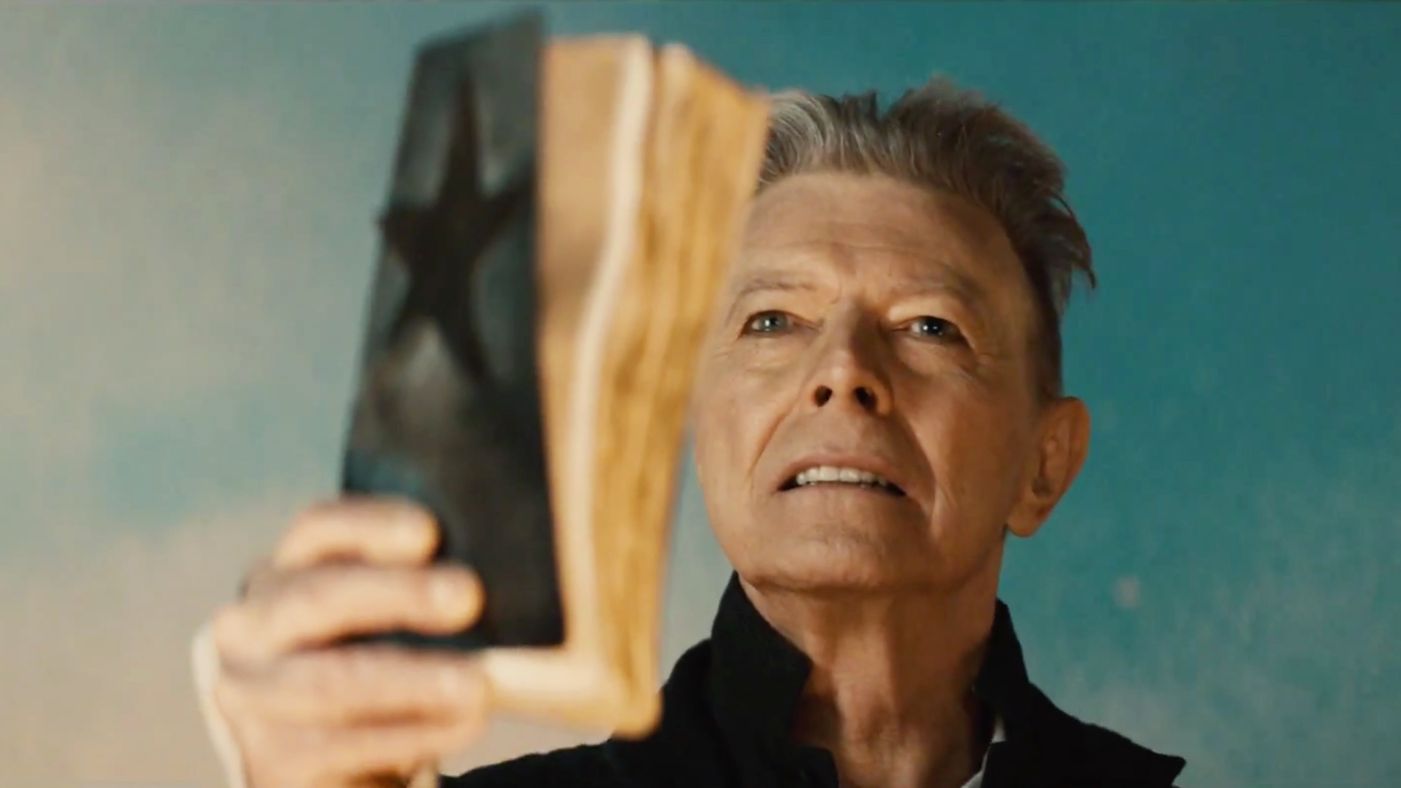Self-Requiem: David Bowie’s “Blackstar” (review)
David Bowie produced the magnificent "Blackstar" knowing it would be his final album

There was always something otherworldly about David Bowie. Whether appearing before us as a pop star, an alien fallen to earth, or sharing a stage with Trent Reznor, he consistently set himself above and apart in any way he could. Blackstar (![]()
![]()
![]()
![]()
![]() ), his twenty-fifth and final studio album, is yet another reinvention, staking out new ground even as it marks the end of a decades-long career. What his producer Tony Visconti called a “parting gift” to fans is surreal, haunting, and as surprising as anything that came before it.
), his twenty-fifth and final studio album, is yet another reinvention, staking out new ground even as it marks the end of a decades-long career. What his producer Tony Visconti called a “parting gift” to fans is surreal, haunting, and as surprising as anything that came before it.
We now know that Bowie had been dealing with terminal cancer for the past 18 months, and produced Blackstar knowing that it would be his final album. The news of his death Sunday night lends the album a sense of finality that few noticed upon its release just two days before. See, for instance, the opening lines of the third track, “Lazarus”: “Look up here, I’m in heaven/I’ve got scars that can’t be seen.” Before Bowie’s death, these lyrics might have seemed a poetic meditation on mortality in the abstract. Cryptic, but in the way we had come to expect from Bowie. Now, their autobiographical nature is more clear. The mortality he reflects on as he sings “I’m dying to fool them, again and again” in “Dollar Days” is his own.
What is striking about Blackstar is its relative shortness — seven tracks in 40 minutes. Bowie’s slow, groaning vocals and the melancholic instrumentation put the multi-part title track somewhere between mellow and haunting. This dissonant opening sets the mood for the rest of the album. From here, nothing will be particularly clear or straightforward. Although the second half is more melodic than the opening, Bowie interrupts the tune more than once as he calls out in a distorted voice, “I’m a Blackstar!” The effectiveness of the discordance is slightly dampened by this repetition. At first it is surprising and somewhat unsettling, but as the phrase “I’m a Blackstar” repeats, the effect is dulled somewhat, and it becomes routine as it continues to loop. Eventually, the tune fades away into a laundry list of what he is not: “not a flash in the pan,” “not a film star,” “not a porn star,” but rather a “star’s star,” a Blackstar.
The second track seems to function mainly as a bridge between the sweeping “Blackstar” and the tense and lyrical “Lazarus.” Even so, “‘Tis a Pity She Was a Whore” holds its own with energetic drumming and a free-wheeling saxophone. Sandwiched between these two songs, the second track is sparse and easily glossed over, although it is aimlessly gleeful enough to remain interesting.
“Lazarus” is tense and dark, and reflects on fame and mortality in the same breath. There is more autobiography in this song than the others, as he sings about being “So high it makes my brain whirl.” “Lazarus,” of course, takes its name from the man raised from the dead in the Gospel of St. John, though we’re left to speculate on what, if anything, is being raised from the dead here.
The instrumentation on “Sue (Or in a Season of Crime)” could be taken for a jazz cover of the opening to a 1970s detective show. Yet underneath the funky guitars is an echoey and atmospheric synth that carries the angst of the rest of the album and eventually comes into the foreground. It is followed by “Girl loves Me,” an incoherent, half-shouted recounting of a week. The aimless angst of these two songs quickly gives way to the gentle ballad “Dollar Days,” in which Bowie seems to make peace with what he’s done, and may never do again. But if “Dollar Days” is a conclusion, the seventh and final track, “I Can’t Give Everything Away,” is an epilogue. Carried by a gently welling synthesizer, the lyrics “Saying no but meaning yes/This is all I ever meant/That’s the message that I sent” could very well be a reflection on everything that came before it. Not just the previous album, but his entire body of work. Bowie, after all, was never in the habit of giving everything away.
Blackstar is not an easy album. The songs’ melodies are chaotic and discordant, their lyrics, enigmatic and often inscrutable. We’re left to guess at their meaning, if indeed there is any to be found — or to just enjoy the chaos. But then again, Bowie never sought to make his work straightforward, even at his most accessible. Blackstar lacks the sci-fi glam of Ziggy Stardust, or the easy charm of Hunky Dory. By now it is a cliche to compare Bowie to a chameleon, or a phoenix, but there is something to it. After all, his most consistent quality was always his urge to constantly reinvent himself. And what was striking about his transformations is how organic they always appeared, coming from within Bowie himself, born out of an intense, deeply artistic curiosity. We were never shown a mask — we always got the real thing.
David Bowie has long been an icon for many. Not the sort of icon that signifies cheap, passing fame, but rather an icon in the fullest, most devotional sense of the word. His compulsion to constantly reinvent and his sheer, unabashed strangeness have been and will continue to be a source of inspiration for other artists and musicians, and a point of identification for those of us who have felt, as he sings on this album’s title track, “born the wrong way ’round.” Certainly, throughout his career and his many self-reinventions, he has provoked inspiration, reverence, and bewilderment — sometimes all three at once. David Bowie the man has now left us, but David Bowie the artist is immortal. And in Blackstar, we have been given a final gift that is every bit as iconic as the Starman himself.
Support Metro Weekly’s Journalism
These are challenging times for news organizations. And yet it’s crucial we stay active and provide vital resources and information to both our local readers and the world. So won’t you please take a moment and consider supporting Metro Weekly with a membership? For as little as $5 a month, you can help ensure Metro Weekly magazine and MetroWeekly.com remain free, viable resources as we provide the best, most diverse, culturally-resonant LGBTQ coverage in both the D.C. region and around the world. Memberships come with exclusive perks and discounts, your own personal digital delivery of each week’s magazine (and an archive), access to our Member's Lounge when it launches this fall, and exclusive members-only items like Metro Weekly Membership Mugs and Tote Bags! Check out all our membership levels here and please join us today!



























You must be logged in to post a comment.